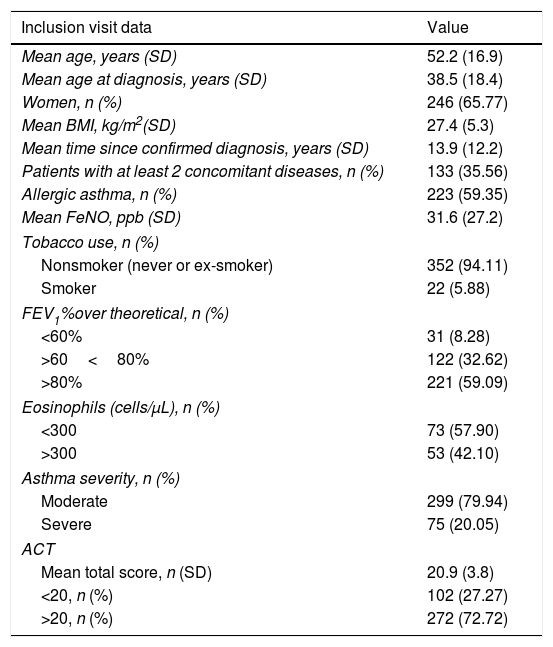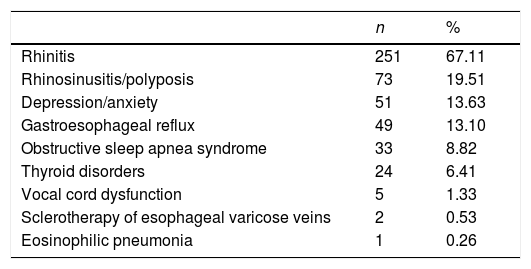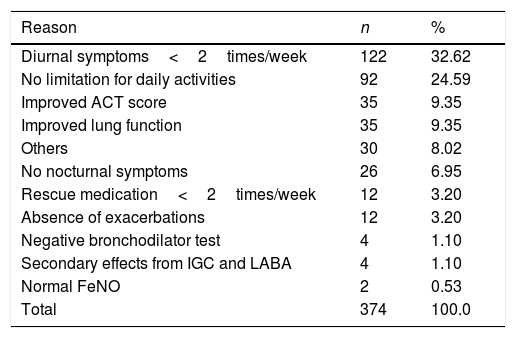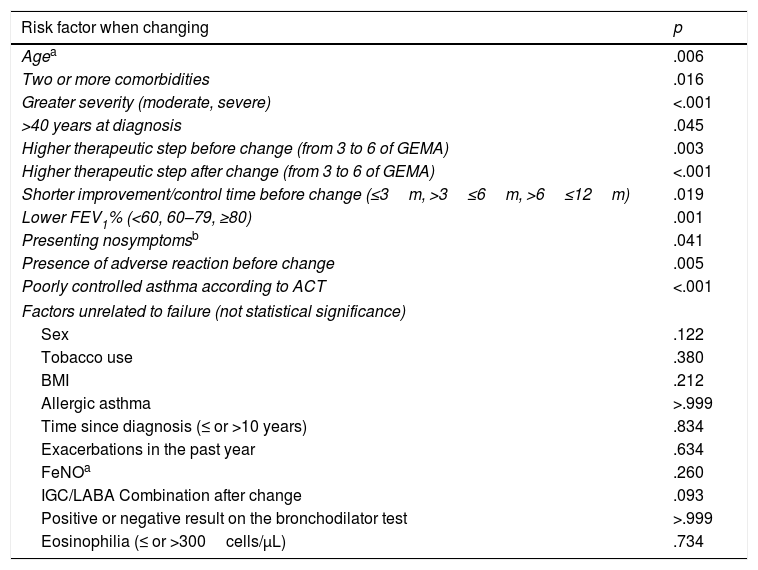Although the clinical practice guidelines recommend continuous adjustment of asthma treatment and reducing the maintenance drugs when achieving control (step-down), there are few studies of standard clinical practice aimed at collecting information on the factors that determine step-down failure.
ObjectiveTo determine the factors that determine step-down failure in standard clinical practice of patients with moderate-severe asthma controlled by a combination of inhaled glucocorticoids and long-acting beta agonists.
MethodsA multicentre retrospective study included 374 patients with moderate-severe asthma controlled with inhaled glucocorticoids and long-acting beta agonists for whom the physician indicated a step-down in 2016.
ResultsThe step-down failed in 41.7% of the patients. The following factors were related to failure: greater patient age (p=.006), presence of at least 2 comorbidities (p=.016), greater severity level (severe persistent vs. moderate persistent) (p<.001), greater age at diagnosis (>40 years) (p=.045), the higher the therapeutic step before (p=.003) and after the change (p<.001), the shorter the time of improvement/control prior to the change (p=.019), lower FEV1 (p=.001) and a poorer Asthma Control Test score or Asthma Control Questionnaire score before the step-down (p<.001). The logistic regression analysis showed a higher probability of step-down failure in the more elderly patients (OR, 0.983; 95% CI 0.969–0.997) and those with severe asthma compared to those with moderate asthma (OR, 0.537; 95% CI 0.292–0.985), as well as an increased probability of success if the patients had the disease controlled for more than 6 months (OR, 2.253; 95% CI 1.235–4.112).
ConclusionIn standard clinical practice conditions, step-down fails in a high percentage of patients, and the suggestion is to indicate step-down when the patient has had more than 6 months of disease control.
Aunque las guías de práctica clínica recomiendan un ajuste continuado del tratamiento del asma, reduciendo la medicación de mantenimiento cuando se alcanza el control (step-down), existen pocos estudios de práctica clínica habitual orientados a recabar información de los factores que condicionan su fracaso.
ObjetivoDeterminar los factores que condicionan en la práctica clínica habitual el fracaso del step-down en los pacientes asmáticos moderados-graves controlados con una combinación de glucocorticoides inhalados/agonistas beta-2 adrenérgicos de acción larga.
MétodoEstudio multicéntrico retrospectivo sobre 374 pacientes con asma moderada-grave controlada con glucocorticoides inhalados/agonistas beta-2 adrenérgicos de acción larga en quienes el facultativo indicó en 2016 un step-down.
ResultadosEl step-down fracasó en el 41,7%. Los factores relacionados con el fracaso fueron: la mayor edad del paciente (p=0,006), la presencia de 2 o más comorbilidades (p=0,016), el mayor nivel de gravedad (persistente grave vs. persistente moderada) (p<0,001), la mayor edad al diagnóstico (>40 años) (p=0,045), cuanto más alto es el escalón terapéutico previo (p=0,003) y posterior al cambio (p<0,001), cuanto menor sea el tiempo de mejoría/control previo al cambio (p=0,019), el FEV1 más bajo (p=0,001) y un peor Asthma Control Test o Asthma Control Questionnaire antes del step-down (p<0,001). El análisis de regresión logística mostró que existe una mayor probabilidad (odds ratio [IC 95%] de fracaso del step-down en los pacientes más añosos: OR 0,983 [0,969-0,997], con asma grave vs. moderada: OR 0,537 [0,292-0,985] y mayor probabilidad de éxito si llevan más de 6 meses con la enfermedad controlada: OR 2,253 [1,235-4,112]).
ConclusiónEn condiciones de práctica clínica habitual el step-down fracasa en un porcentaje alto de pacientes y se recomienda indicarlo cuando el paciente lleve más de 6 meses controlado.
Article
Diríjase desde aquí a la web de la >>>FESEMI<<< e inicie sesión mediante el formulario que se encuentra en la barra superior, pulsando sobre el candado.

Una vez autentificado, en la misma web de FESEMI, en el menú superior, elija la opción deseada.

>>>FESEMI<<<











